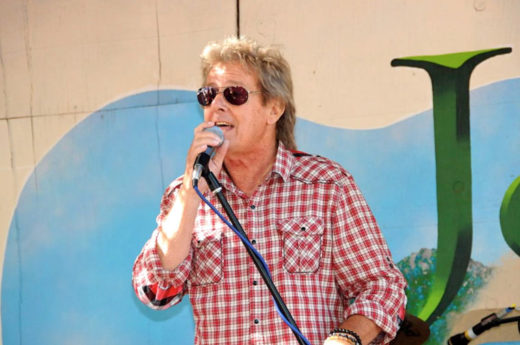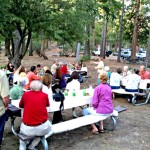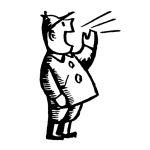
Bill Sheppard was there. Right in the center of West Coast rock and roll. Right when it was all happening.
And not many know how big his career was. It turns out, Bill is so modest even his wife and sons did not know how close to the sun he flew with the groups with which he played, sang and recorded.
When Bill tells his story, there is always a smile and a gentle knowingness. And if anyone who reads this had the experience of being fans or groupies of rock or pop groups, or were actually in music from the mid-1960s to the late 1970s, you will understand what the smile and nod mean.
It was a unique time in American cultural history and musical evolution. A confluence of events political and social created a vibe that may never again be repeated. “Back then it was magic,” said Bill. “Not a lot of people were [rock] musicians then. You could walk into a room and be immediately accepted. The time was fun, harmless and we were more thoughtful, cheerful and a lot more accepting.”
Bill had his first professional gig when he was 13, playing sax Friday and Saturday nights in Huntington Beach with Denny and the Chancellors, a group with a current record. “We backed all the Motown singing groups that came in,” said Bill.
At the same time, while still in junior high school, Bill was a math brain, winning the Orange County-wide math award in eighth grade. And that is just the beginning of a regular music career that began at 13.
After a few years, the lead singer of D and C quit and Bill took over. Then a group called the Fabs, also with a record, heard Bill singing and offered him the lead singer position in the already successful band. At that time in Southern California, groups soon to be famous were forming and everyone knew everyone. “In 1965 I was asked into a recording studio to do vocals for a group whose lead singer was having pitch or phrasing problems so I laid the vocal on ‘Mister, You’re a Better Man Than I.’ The group was The Yardbirds.
“I would do it all over again in a minute,” said Bill. “It all flowed, it was all connected and it all seemed inevitable. Each new thing just presented itself as the next thing. We didn’t know we were naïve. We were just riding the waves and the waves kept coming.”
And the next wave was the biggest. At 18, five years into his pro career, Bill and two members of the Fabs formed the nucleus of Stack. Stack would develop its own cult following because of its high-energy concerts, and the quality of its instrumentals and vocals. Stack was endorsed by Sunn amplifiers as was The Who. “So, when The Who was not touring, we used their equipment,” remembered Bill. This was before the release of “Tommy.”
Stack released only one album, “Above All.” Bill noted that original copies of the vinyl album now sell for about $7,500, so strong was the concert following for this group.
After two years with Stack, managers wanted to book the group into clubs and require them to play for four hours each night. And that was it for Bill. “I could not perform, at the energy level we did, for four hours and I left for that reason,” he said.
After Stack, Bill arranged, sang and recorded a folk album, while based out of Running Springs. He toured Canada for a year in the summer of 1970 and came back to SoCal and started working night clubs.
As the musical waves continued to create flow, a producer heard Bill singing and tapped him to be part of a new group, Ruby Wheller. The producer bought a house and paid the new group to live and rehearse in the house for a year. “This was a great group,” said Bill. “The music was superb. But we came out of that year just when disco hit. And as a result, we played big venues one time only. We were doing original rock material and everyone wanted disco dancing.”
As part of musically surfing those exciting and formative years in rock and roll, Stack played on the bill with The New Yardbirds (soon to become Led Zeppelin), opened for Iron Butterfly, Three Dog Night, Chicago Transit Authority (later Chicago), The Byrds, The Flying Burrito Brothers, Jimi Hendrix and Alice Cooper.
After the heady ride, Bill stopped playing for around 15 years, transitioning into being a representative for musical instruments and amps, and creating sound design for major Las Vegas hotels and concert venues.
“On May 15, 2006, my wife Debbie and I came up to Idyllwild on our 24th anniversary for a visit,” he remembered. “We had no plans of moving from our home in Orange County that we were still remodeling. But we drove by a house that was for sale. The price had just been lowered. Forty-six days later, our house had sold and we were living in Idyllwild.” The Sheppards own the local video store and Bill still plays and sings locally.
As an anecdote, underlining his modesty, Bill recounted taking Debbie and sons Billy and Danny to the Fender Museum in Fullerton where a 50-year exhibition about Orange County’s history as a rock and roll mecca was being mounted. “There were walls of displays and booths on each group, including Stack, said Bill. “The kids did not know anything about my history. Even Debbie did not know that much.”
That evening, the family attended a dinner honoring the groups, among them the Righteous Brothers and No Doubt. “Danny looked around and said, ‘You’re in here with all these groups?!!’”
And yes, Bill Sheppard was. He was there. In the middle of it all, just as the Orange County rock and roll wave was ready to ride.











Wow I’m impressed. Caryn Yarema Powell
“I coulda’ been SOMEBODY!” Marlon Brando, Streetcar Named Desire, Tennessee Williams.